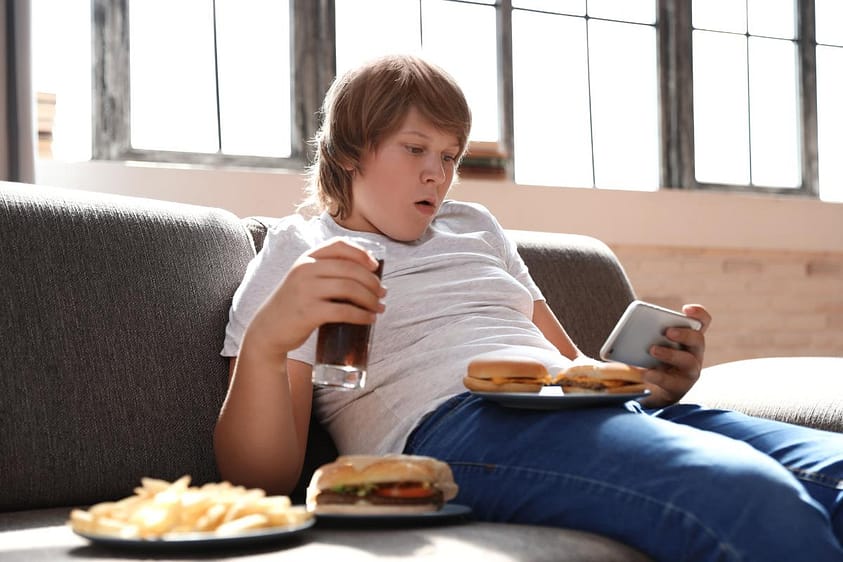Many teenagers around the world may struggle with disordered eating every day. For many, disordered eating is a way to control otherwise uncontrollable situations. When the body is undergoing hormonal changes, many teens develop unhealthy relationships with food. Binge eating is increasingly popular. While it may seem less detrimental than other disordered eating habits, those who are binge eating still need professional support from an adolescent eating disorder treatment center.
If you suspect your son is binging or has other unhealthy eating habits, Foothills at Red Oak Recovery® is ready to help. Our holistic therapy and rehabilitation programs help adolescent boys address and heal from disordered eating. Reach our staff today at 866.300.5275 to learn more.
What Is Binge Eating?
Binge eating is recognized as a type of disordered eating, which is a broad term that encompasses a range of unhealthy eating patterns, including those classified as eating disorders. Disordered eating behaviors are often associated with distorted body image issues and an unhealthy relationship with food, both of which are critical factors in understanding the complexity of these conditions.
For individuals living with binge eating disorders, this condition may manifest as alternating periods of fasting and overeating. Specifically, someone might fast for several hours or even days, only to later consume excessive amounts of food in a short period. There are also cases where individuals may engage in binge eating followed by purging through vomiting or the use of laxatives. Others may opt to counteract their calorie intake through excessive exercise.
Typically, binge eating episodes involve the consumption of large quantities of food, often high in empty calories and lacking nutritional value. This pattern of eating is not just about physical hunger; it’s also about trying to cope with emotional needs or to fill a perceived void.
Negative Thoughts Fuel the Process
Like all forms of disordered eating, binge eating is frequently accompanied by negative thoughts and feelings about food, self-image, guilt, and shame, contributing to a vicious cycle of emotional distress and unhealthy eating behaviors. Moreover, binge eating is usually carried out in secret and often follows a ritualistic pattern, adding to the isolation and emotional burden experienced by those affected.
The psychological impact of binge eating and disordered eating, in general, cannot be understated. It’s a complex interplay of emotional, physical, and societal factors that demands a compassionate and multifaceted approach to treatment and support.
Dangers of Binge Eating and Other Disordered Eating
We may think it’s common for teens to binge eat. Growth hormones and social life can often cause teenagers to eat excessively. However, occasional social binging is not binge eating. While binging may seem less serious than other types of disordered eating, it can harm a teen’s physical and mental health.
1. Physical Dangers of Binge Eating
There is a range of physical dangers of binge eating, including:
- Malnutrition from excessive empty calories
- Bulimia for those who binge and purge
- Anorexia for those who fast and binge
- Self-harming behavior
- Diabetes, hypertension, and other food-related diseases
- Process addictions
- Drug or alcohol use
2. Self-Isolation
When a teen engages in unhealthy eating habits, they often self-isolate. Group activities involving food can be difficult for those coping with disordered eating. This means teens struggling with binge eating might hide food, avoid family and group meals, and express anger or aggression when food is mentioned or served.
3. Mental Health Issues
Binge eating is often a symptom of a deeper issue in a teen’s life. It may be a way someone copes with undiagnosed mental health problems. It may also stem from unhealthy relationships, unhealed trauma, and a lack of self-worth. For some, binge eating may result in severe signs of nutritional deficits. These may begin when they lack essential nutrients for brain and body health.
Begin Holistic Treatment for Binge Eating in North Carolina
The first step in treating binge eating and other disordered eating is finding your son’s support. For instance, Foothills at Red Oak Recovery® provides clients with comprehensive support in the picturesque, rolling hills of North Carolina.
Our center specializes in treating teenage boys with alcohol, drug, and process addictions and disordered eating. For those struggling with binge eating and other unhealthy relationships with food, a range of therapies, nutritional counseling, and the support of other teenage boys can help.
Get Your Teen the Support He Needs at Foothills at Red Oak Recovery®
Teens come to Foothills to disconnect from their stressful lives and reconnect with themselves. Our clients love our equine-assisted and wilderness therapy programs. Engaging with the natural world helps the teenage boys at Foothills find themselves and rediscover their self-worth. Are you ready to help your son recover from binge eating? Call Foothills today a 866.300.5275 or use our online contact form to learn how we can help.





